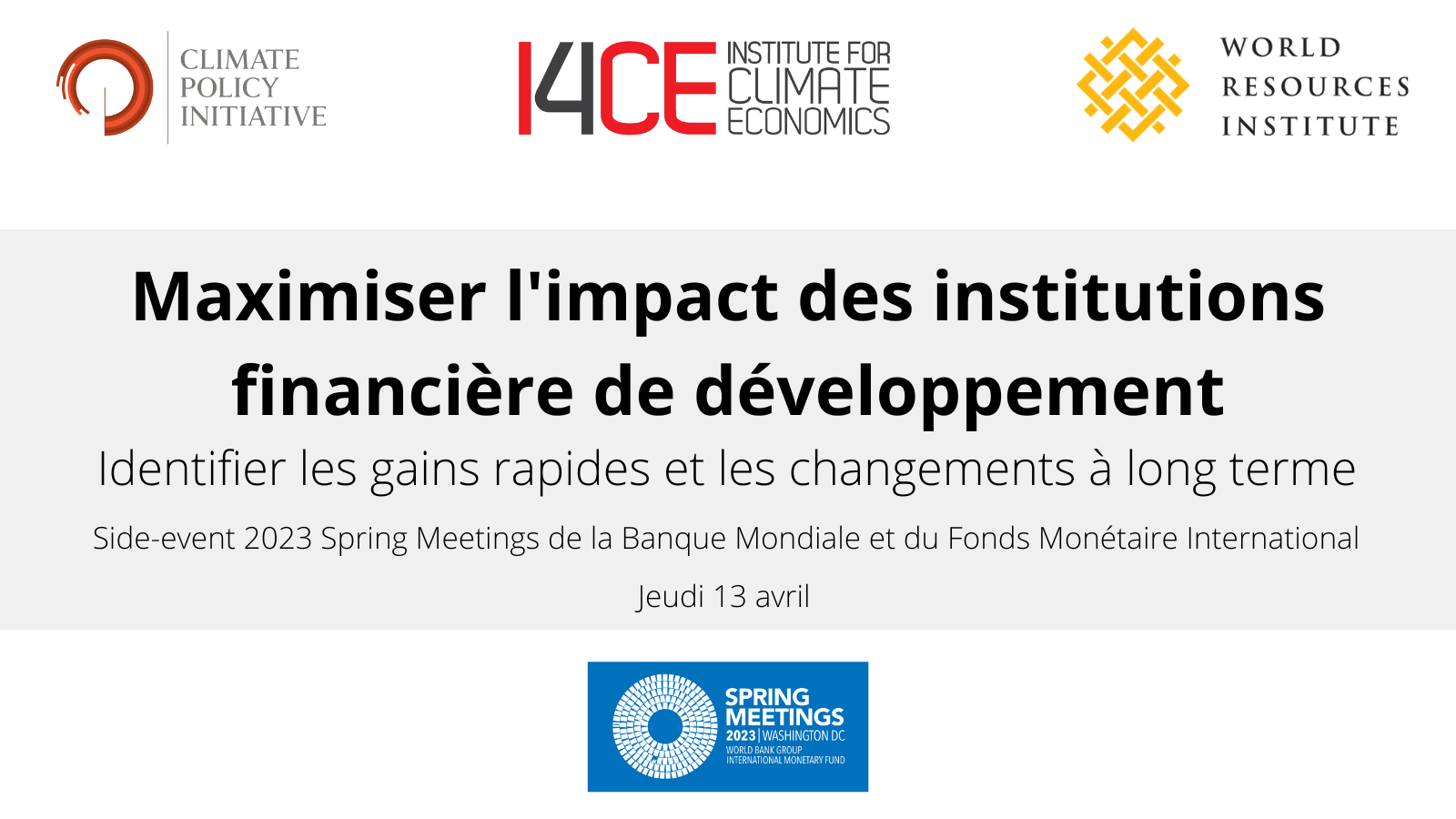Maximiser l’impact des institutions financières de développement
Conférences - Par : Alice PAUTHIER / Claire ESCHALIER / Benoît LEGUETCet événement était uniquement en anglais.

Contexte
En 2022, un consensus mondial a été atteint sur la nécessité de réformer l’architecture financière mondiale, considérée comme n’étant plus « adaptée à son objectif ». L’année 2023 sera riche en événements organisés pour aborder les différentes parties du programme de réforme de l’architecture financière. Les Spring Meetings de la Banque mondiale et du Fonds monétaire international constituent la première étape clé de ce programme.
Les institutions de financement du développement (IFD) jouent un rôle clé dans l’orientation des finances publiques internationales. La pression sur elles est forte, les actionnaires, les pays bénéficiaires et le grand public attendant d’elles qu’elles augmentent le volume des fonds mobilisés dans le contexte actuel de crises multiples. Une grande partie du débat se concentre sur ce défi majeur. Mais au-delà du volume de leurs ressources, il convient également de s’intéresser au fonctionnement des banques publiques de développement afin de maximiser l’impact de leurs activités sur la transition durable des économies nationales.
Objectifs
Organisé par les think tanks I4CE, World Resources Institute et Climate Policy Initiative, ce side-event des Spring Meetings a pour but d’amener les institutions financières internationales, leurs actionnaires, les pays bénéficiaires et les experts des ONG à débattre de la meilleure façon de déployer le financement international du développement – en garantissant une efficacité maximale – en fonction des besoins spécifiques des pays.
Format : atelier fermé.
Organisateurs : Institute for Climate Economics I4CE, World Resources Institute (WRI), Climate Policy Initiative (CPI).
Date : jeudi 13 avril
Provisional agenda:
Moderator: Bella Tonkonogy, Climate Finance Director, Climate Policy Initiative.
Welcome remarks: Valerie Laxton, Senior Associate, World Resources Institute.
Keynote speech: Laurence Tubiana, CEO of the European Climate Foundation (ECF).
Introductory presentations: What to expect from DFIs? Where is their support most needed for the transition to sustainable economies? Where can they have the most impact?
- Where is DFIs support most needed for the transition to resilient economies?
- Ministry of Environment
- Ministry of Finance
- How to identify where DFIs support is needed? Benoît Leguet, Managing Director, I4CE
Panel discussion: Perspectives of Development Banks: How have DFIs already started to increase their impact for the transition of countries towards a sustainable development? How could they further maximise impact of operations? What quick wins and long-term changes over different time horizons?
- Shifting towards impact indicators:
- European Investment Bank – Nancy Saich, Chief Climate Change Expert (TBC)
- Shifting towards systemic approaches:
- European Bank for Reconstruction and Development – Maya Hennerkes, Director, Green Financial Systems, Climate Strategy and Delivery Group (TBC)
- Supporting the low-carbon transition of countries:
- Interamerican Development Bank – Graham Watkins, Climate Change Division Chief
- Asian Development Bank – speaker TBC
- Supporting the resilience of countries:
- World Bank – Stéphane Hallegatte, Senior Climate Change Adviser
- Caribbean Development Bank – speaker TBC
Questions and Answers
Concluding remarks: How can the reform agenda foster the transformation of DFIs for transformational impact?
- Perspectives of NGOs Climate Action Network representative – speaker TBC
- The G20 Agenda Charlotte Gardes-Landolfini, Climate Change, Energy and Financial Stability Expert, International Monetary Fund
- The Summit for a New Global Financial Pact, William Roos, Assistant Secretary Multilateral, Development and Trade affairs, French Treasury (5 minutes) (TBC)
About CPI:
CPI is an analysis and advisory organization with deep expertise in finance and policy. Our mission is to help governments, businesses, and financial institutions drive economic growth while addressing climate change. Our vision is to build a sustainable, resilient, and inclusive global economy.
About I4CE:
I4CE is a non-profit research organisation that provides independent policy analysis on climate change mitigation and adaptation. We promote climate policies that are effective, efficient and socially fair. Our 40 experts engage with national and local governments, the European Union, international financial institutions, civil society organisations and the media. Our work covers three key transitions – energy, agriculture, forests – and addresses six economic challenges: investment, public financing, development finance, financial regulation, carbon pricing and carbon certification.
About WRI:
WRI is a global nonprofit organization that works with leaders in government, business and civil society to research, design, and carry out practical solutions that simultaneously improve people’s lives and ensure nature can thrive.
